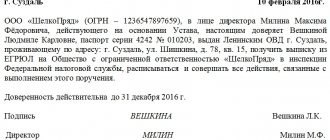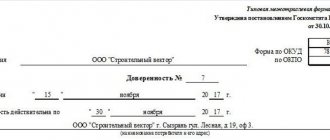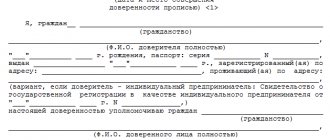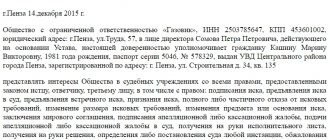Typically, a power of attorney to receive documents is required in cases where the principal, for some reason, cannot independently pick up the papers he needs. This document is presented to almost any institution - both government (tax inspectorates, passport offices, extra-budgetary funds, etc.) and commercial structures (banks, financial institutions, enterprises and organizations). You can issue a power of attorney to receive almost any document, be it certificates, personal papers, registration certificates, etc. Such a power of attorney can be issued by both an individual and a legal entity.
Examples of powers of attorney to receive documents:
- from an individual - from a legal entity - from a notary - from bailiffs - from the MFC - from the Social Insurance Fund
A “hot” example of a power of attorney to receive documents from the tax office, as well as a blank general form, is presented below:
- Form and sample
- Free download
- Online viewing
- Expert tested
FILES
Registration of a power of attorney to receive goods and materials
Powers of attorney to receive goods, regardless of whose name they are drawn up, have the usual written form that does not require notarization.
For example, a power of attorney for receiving goods or goods and materials issued on behalf of an individual is drawn up in free form and certified only by the personal signature of the principal. This document, in accordance with Article 185 of the Civil Code of the Russian Federation, can be issued either directly to a third party who will ship (delivery, etc.) of the goods, or to a representative for presentation at the place of demand.
Powers of attorney from legal entities are usually drawn up, in accordance with Resolution of the State Statistics Committee of Russia No. 71a of October 30, 1997, according to unified forms M-2 and M-2a. We'll talk more about these forms later. In addition to unified forms, legal entities can also use their usual form of powers of attorney - provided that all the necessary details are indicated - this does not contradict the law.
It should be said that a power of attorney to receive goods and materials must necessarily contain an indication of specific goods or other valuables indicating their quantity that the authorized person is supposed to receive. If goods are received according to an invoice, specification for a contract or other document containing a complete list of those goods to be received, it is permissible not to list all the values to be received in the power of attorney itself. But in this case, it must contain an indication of such a document.
It is also important to note that, regardless of the form in which the power of attorney to receive goods is drawn up (free or unified), a mandatory condition for the validity of the power of attorney is to indicate the date of its preparation. If this requirement is not fulfilled, the power of attorney is considered void - and therefore does not entail the rights or obligations of the parties.
Types of powers of attorney
The main types of documents transferring powers:
- One-time . Provided for the purpose of a third party performing a specific action. For example, on the basis of a power of attorney, a representative can only sign the purchase and sale agreement. The document can no longer be used.
- Special . On the basis of such a power of attorney, the representative can perform similar operations during the agreed period of validity of the document.
- General . On the basis of such a power of attorney, the representative can perform all necessary actions related to the disposal of the principal’s property. That is, on the basis of this document, the representative receives an expanded list of rights.
A general power of attorney is a special type of document. It can only be issued to a person on whom the principal can completely rely. The risk that the representative may betray trust must always be taken into account. Based on a general power of attorney, a person receives exclusive powers. Therefore, the risk of abuse is high.
Types of documents by type of authority granted
On the basis of a power of attorney, general or exclusive powers can be granted. Let's consider the general powers within the framework of office work (Article 35 of the Code of Civil Procedure, Article 41 of the Arbitration Procedure Code, Article 45 of the CAS):
- Familiarization with the case materials.
- Making extracts and making copies.
- Providing evidence.
- Participation in the study of the evidence presented.
- Statement of petitions.
Exclusive powers within the framework of legal proceedings (Article 54 of the Code of Civil Procedure):
- Signing the claim and filing it in court.
- Referring the dispute to arbitration.
- Submitting a counterclaim.
- Changing the scope of claims in a claim.
- Drawing up a settlement agreement.
- Appealing decisions.
General powers are understood as powers that do not need to be separately enshrined in a power of attorney. If these are exclusive powers, the list of them must be indicated verbatim. If they are not specified, the representative will not be able to use them.
Power of attorney form for receiving goods from a legal entity in Word
An enterprise can develop its own form of power of attorney to receive goods.
Typically, a document is developed using Microsoft Word. When issuing a power of attorney on the letterhead of a legal entity, information about the organization (OGRN, INN, legal address), the name of the manager or other person authorized to issue powers of attorney, and the name of the document on the basis of which the latter acts is indicated. Next, the personal data of the representative must be indicated: last name, first name, patronymic, date of birth, details of the identity document, address of residence. Then the order should be described in detail, indicating the list of goods to be received, and the rights of the representative, indicating the right to sign delivery notes or other documents that accompany the acceptance of the goods.
Responsibility of the principal
Notification of all persons affected by the revoked power of attorney is a mandatory element of this procedure for the principal. If this condition is not met, unpleasant consequences are possible.
Sending notices of termination of the powers of the guarantor is, by law, the obligation of the principal, and not his right.
If the representative of the revoked license performs on behalf of the principal any actions for which he no longer has the right, and third parties have not received notification of this (in writing or through the media), then they will not bear any responsibility for all the consequences of the actions taken.
Everything that the guarantor does will be the personal responsibility of the principal who neglected his duties, including possible illegal actions, for which the person who issued the power of attorney will also have to answer.
In addition, if the principal violated the notification regime, and the guarantor. Without knowing anything about the revocation of the power of attorney, he performed some actions within the framework of the previously granted powers and at the same time incurred certain expenses, the principal is obliged to reimburse them in full.
Execution of a power of attorney to receive goods and materials from an individual
In essence, powers of attorney for receiving goods and materials from legal entities and individuals are almost identical.
The only difference is in the person who certifies the power of attorney and the information about the principal that must be indicated in the document. We listed the data that is reflected in the form of a power of attorney to receive goods from a legal entity above. When issuing a power of attorney by an individual, its content remains the same, and information about the principal must contain his last name, first name and patronymic, date of birth, as well as information about the identity document (number and series, date of issue, name of the issuing authority and department code) and place of residence. If a citizen is registered as an individual entrepreneur, his TIN should be indicated; In addition, in this situation, the power of attorney is certified by the seal of the individual entrepreneur (if available).
Procedure for revoking a power of attorney
IMPORTANT! Recommendations for drawing up a notice of revocation of a power of attorney from ConsultantPlus are available here
It would be more correct to call such an action not “revocation of a power of attorney,” but “cancellation of authority.” Since the result of such an action will be precisely the termination of the representation.
To complete this procedure, you cannot do without a notary who certified the issued power of attorney. What needs to be done by the principal who wishes to cancel this document:
- write a statement in which you notify the notary of your will to terminate the power of attorney;
- decide on who will notify the representative about the termination of his right - you yourself or a notary;
- if you decide to use the help of a notary to notify a representative, the representative of the law himself will send out official notices;
- after the notary has sent the notices, he will provide you with evidence that the notice was served;
- it is necessary to notify not only the representative, but also all possible “addressees” who were supposed to be presented with a power of attorney to act on behalf of the guarantor;
- a note on the revocation of the power of attorney in a special notary register (made by a notary);
- the power of attorney is returned by the recipient to the person who issued it.
IMPORTANT! If it is impossible to accurately determine the scope of the possible validity of the power of attorney or it is too broad, that is, targeted notification of third parties is impossible, you need to notify them through the media. To do this, you need to place the relevant information in the Kommersant newspaper. This does not cancel the obligation to personally notify the guarantor himself.
Power of attorney to receive goods in free form
A power of attorney from an individual to receive goods can also be drawn up in free form (simple written form). However, even if you refuse a unified power of attorney, you must indicate the following information in it:
- Document's name.
- The date of drawing up the power of attorney - otherwise the document will be considered void.
- FULL NAME. the person writing the power of attorney and full name. the person receiving this authority; information about your identity document and place of residence.
- Information about the product received - name, contract information.
- Signatures of the persons specified in the power of attorney.
A free power of attorney can be printed or handwritten. There is no need to have it specially certified by a notary.
Do you need a reason?
The power of attorney has such a name because it is designed for a certain amount of trust of both parties in each other. If an individual or company entrusts someone to act in its place for any authorized action, it has the right to terminate this opportunity at any time.
Question: Does an organization have the right to revoke an irrevocable power of attorney by sending a revocation that is not notarized? View answer
There can be many reasons for this, for example:
- loss of trust
- termination of contractual relations,
- termination of contract, etc.
But the principal is not obliged to voice them either to the notary or to his representative, since the granting of powers from the point of view of the law is a one-sided transaction.
How to cancel the power of attorney of the head of the branch ?
To terminate a power of attorney, the expressed will of the person who issued it is sufficient and the procedure is carried out completely according to the law - in accordance with Art. 188, 189 of the Civil Code of the Russian Federation.
REFERENCE! The procedure for revoking a power of attorney is enshrined in clause 10 of the Methodological Recommendations for Certifying Powers of Attorney, approved by the decision of the Federal Notary Chamber of July 7-08, 2003, Protocol No. 03/03.
Guarantor and return of power of attorney
The refusal of the guarantor, notified of the cancellation of the power of attorney, to return it to the principal is a reason to contact law enforcement agencies: legally, this can be regarded as an attempt at fraud. You can first draw up an act of refusal to return the power of attorney and make a note on it about the guarantor’s refusal to sign it, if it follows. Signatures of witnesses to this action will be required.
What if the representative disappears? In cases where the representative avoids contact and his whereabouts are unknown, it would be legally correct to send a notice of revocation of the power of attorney to any of the addresses previously specified by him, making sure to keep the delivery notice. From the point of view of the law, it will be considered received.
FOR YOUR INFORMATION! Third parties are not obliged to verify the good faith of the guarantor and the validity of the power of attorney. All responsibility lies with the principal.
Obtaining a foreign passport
If we are talking about a foreign passport, then you need to issue a special power of attorney. This is a document that sets out the specific powers of the representative (only submitting the necessary documentation, only receiving a foreign passport, or both) during a certain time period (several weeks may pass between submitting documents and receiving a ready-made foreign passport, so the validity period of the trust document is necessary register “with reserve”).
A foreign passport does not require a personal signature of the recipient, so it can be obtained by proxy. But, the main reason for issuing a trust document is to recognize the applicant as completely or partially incompetent. A power of attorney is issued to the legal representative of the applicant - guardian, close relative, spouse.
If the applicant has health problems and cannot submit documents in person, you can call a migration service employee to your home. To do this, a written application is drawn up and sent to the territorial office of the Main Department of the Ministry of Internal Affairs of the Russian Federation at the place of residence of the applicant. You can also obtain a completed foreign passport at home. This possibility is prescribed in Order of the Ministry of Internal Affairs No. 864 of November 16, 2017.











